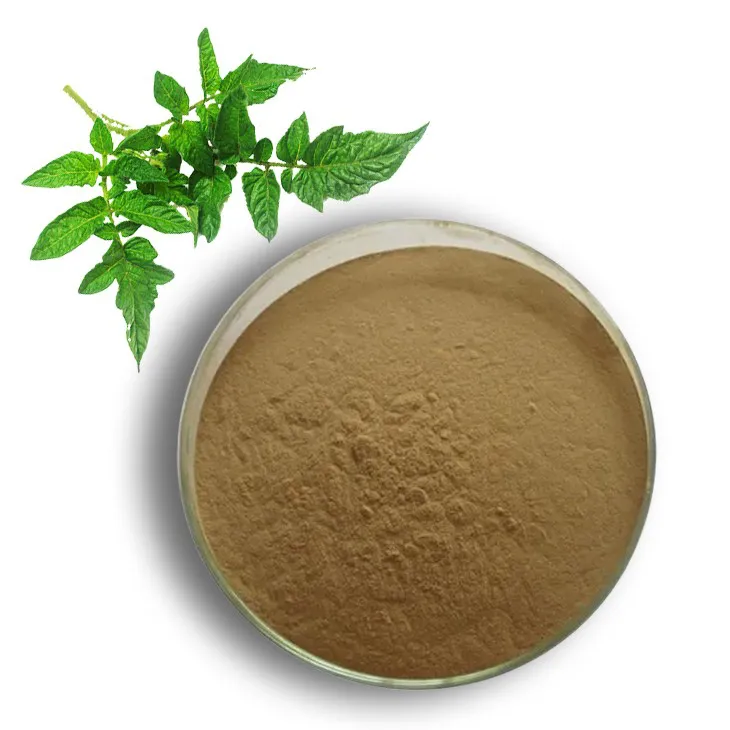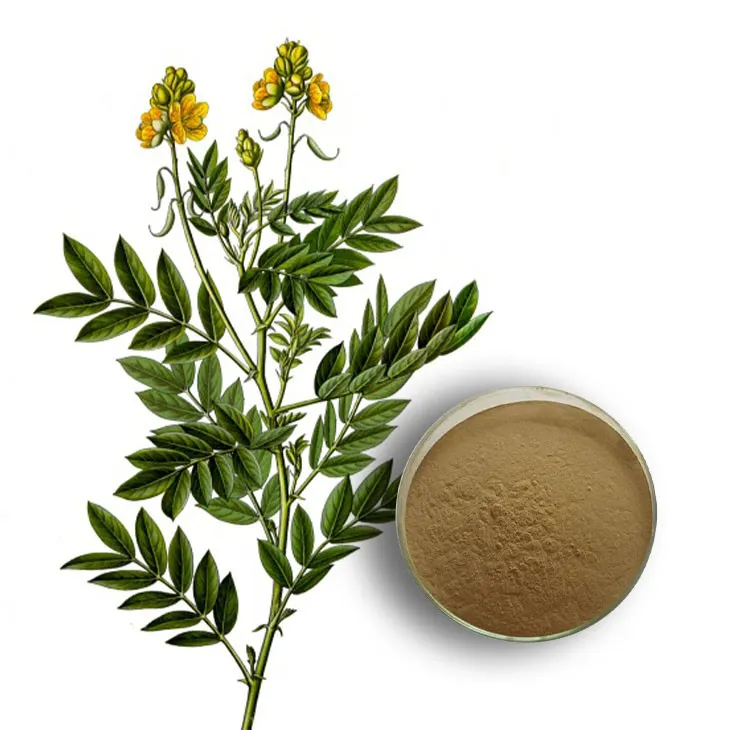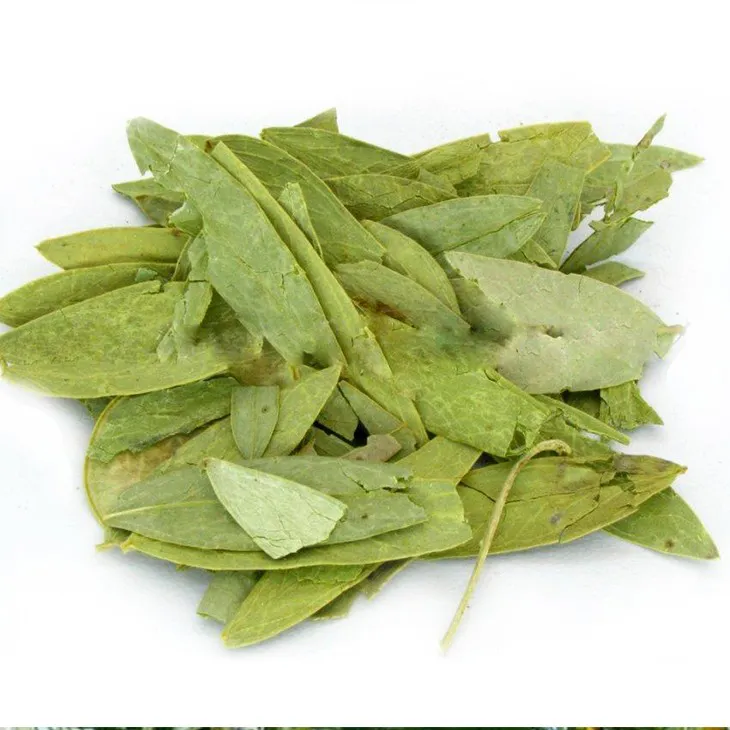- 0086-571-85302990
- sales@greenskybio.com
The flavor of ripe senna leaves and natural senna leaf extracts.
2024-11-12

Taste of Ripe Senna Leaves
The taste of ripe senna leaves is a complex and distinct characteristic that has been of interest in various fields. Ripe senna leaves possess a bitter taste, which is one of the most prominent features. This bitterness is not just a simple flavor note but is related to the chemical composition of the leaves.
When tasted, the bitter flavor of senna leaves gradually unfolds on the palate. It is not an overpowering bitterness that is unbearable but rather a characteristic that gives the leaves their unique identity. This bitterness can be somewhat astringent as well, leaving a dry feeling in the mouth after consumption. It is important to note that the taste can vary depending on factors such as the variety of senna, the growing conditions, and the time of harvest.

Aroma of Ripe Senna Leaves
The aroma of ripe senna leaves is another aspect that contributes to their overall flavor profile. The leaves emit a somewhat earthy and herbal aroma. It is a natural, fresh scent that is characteristic of many medicinal and herbal plants.
When the leaves are crushed or bruised, the aroma becomes more pronounced. The earthy note is often accompanied by a faint, almost sweet undertone, which provides a contrast to the bitter taste. This combination of aroma and taste is what makes senna leaves distinct in the world of herbal products.

Pharmacological Actions of Ripe Senna Leaves
Ripe senna leaves have significant pharmacological actions that are related to their chemical constituents. One of the main actions is their laxative effect. Senna contains compounds such as sennosides, which stimulate the intestinal muscles, promoting bowel movements.
These pharmacological actions are also related to the taste and aroma in a way. The bitter taste, for example, may be an indication of the presence of these active compounds. The body has evolved to recognize bitter tastes as potentially having medicinal properties. In traditional medicine, the bitter taste of senna was seen as a sign of its ability to cleanse the body, especially the digestive system.
However, it is important to use senna leaves for their pharmacological actions with caution. Overuse can lead to adverse effects such as abdominal cramps, diarrhea, and electrolyte imbalance. It is always advisable to follow proper medical advice when using senna for medicinal purposes.

Extraction Process of Natural Senna Leaf Extracts
The extraction of natural Senna Leaf Extracts involves several steps. First, the ripe senna leaves are carefully harvested. Quality control at this stage is crucial, as the quality of the leaves will directly affect the quality of the extract.
Once harvested, the leaves are usually dried to reduce moisture content. Drying can be done through natural methods such as air - drying or through the use of controlled drying equipment. After drying, the leaves are then ground into a fine powder. This powder is then subjected to the extraction process.
The extraction can be carried out using different solvents. Commonly used solvents include water, ethanol, or a combination of both. The choice of solvent depends on various factors such as the desired components to be extracted and the intended use of the extract. For example, water extraction may be more suitable for obtaining certain water - soluble compounds, while ethanol extraction may be better for extracting lipophilic compounds.
After extraction, the resulting liquid is then purified and concentrated. This may involve processes such as filtration to remove impurities and evaporation to increase the concentration of the active components. The final product is a natural Senna Leaf Extract, which contains the concentrated active compounds of the senna leaves.
Taste of Natural Senna Leaf Extracts
The taste of natural senna leaf extracts is related to the taste of the original senna leaves but is often more concentrated. The bitter taste is more pronounced in the extract. This is because the extraction process concentrates the compounds responsible for the bitter taste, such as sennosides.
However, the taste of the extract can also be modified during the extraction and formulation process. For example, if the extract is intended for use in a dietary supplement, flavorings may be added to mask the bitter taste. But in its pure form, the extract has a strong, bitter flavor that is characteristic of senna.
Aroma of Natural Senna Leaf Extracts
The aroma of natural senna leaf extracts also retains some of the characteristics of the original leaves. The earthy and herbal aroma is still present, although it may be somewhat different due to the extraction process. The extraction may enhance certain aroma components while reducing others.
Similar to the taste, the aroma of the extract can be adjusted during the production process. This is especially important when the extract is used in products such as perfumes or aromatherapy products, where the desired aroma profile needs to be carefully crafted.
Pharmacological Actions of Natural Senna Leaf Extracts
The pharmacological actions of natural senna leaf extracts are similar to those of the ripe senna leaves. The extract, being a concentrated form of the active compounds, may have a more potent effect. The laxative action, for example, is still the main pharmacological effect.
However, due to the concentration of the extract, the dosage needs to be carefully controlled. A smaller amount of the extract may be required to achieve the same effect as a larger amount of the original leaves. This also means that the potential for adverse effects is higher if the extract is not used properly.
Significance in Different Areas of Human Interest
Medicinal Use
In the field of medicine, both ripe senna leaves and their natural extracts have been used for centuries. They are mainly used as laxatives to relieve constipation. The pharmacological actions of senna make it a valuable tool in digestive health management.
However, as mentioned earlier, proper medical supervision is required when using senna for medicinal purposes. In addition to its laxative properties, research is also being carried out to explore other potential medicinal uses of senna, such as its antioxidant and anti - inflammatory properties.
Food and Beverage Industry
In the food and beverage industry, senna extracts are sometimes used as flavorings. The unique bitter and earthy flavor can add depth to certain products. However, due to the laxative properties of senna, its use in food and beverages is highly regulated.
For example, in some herbal teas, a small amount of senna may be added for its flavor and potential mild digestive benefits. But the amount must be carefully controlled to avoid any unwanted laxative effects on consumers.
Cosmetic and Aromatherapy
In the cosmetic and aromatherapy industries, the aroma of senna is of interest. The earthy and herbal scent can be used in perfumes, lotions, and other cosmetic products. In aromatherapy, the aroma of senna may be used to promote relaxation and a sense of well - being.
However, it is important to ensure that the products are safe for use on the skin and that any potential allergic reactions are taken into account. The natural senna leaf extract may be incorporated into these products in a way that balances its aroma and potential benefits while minimizing any risks.
Conclusion
The flavor of ripe senna leaves and natural senna leaf extracts is a multi - faceted aspect that is related to their taste, aroma, pharmacological actions, and significance in different areas of human interest. Understanding these aspects is crucial for the proper use and development of senna - based products.
Whether in the medical, food, or cosmetic fields, senna has a unique place. However, due to its pharmacological properties, especially its laxative effect, it is necessary to handle it with care and ensure that it is used in a safe and appropriate manner.
FAQ:
What are the main taste characteristics of ripe senna leaves?
The taste of ripe senna leaves is somewhat bitter. This bitterness is an inherent part of its chemical composition. It also has a slightly earthy flavor, which may be related to the plant's growth environment and the substances it absorbs from the soil during growth.
How does the aroma of natural senna leaf extracts differ from that of ripe senna leaves?
The aroma of ripe senna leaves is relatively mild, with a faint herbal scent. In contrast, natural senna leaf extracts may have a more concentrated aroma. During the extraction process, some volatile substances are concentrated, which can enhance the characteristic herbal smell of senna, and may also have some additional scents depending on the extraction method and solvents used.
What are the main pharmacological actions of ripe senna leaves?
Ripe senna leaves have laxative effects. They contain substances such as sennosides, which can stimulate the intestinal wall, increase intestinal peristalsis, and thus help relieve constipation. Additionally, it may also have some antibacterial and anti - inflammatory properties, which are beneficial for maintaining the health of the intestinal tract to a certain extent.
How is the natural senna leaf extract obtained?
Natural senna leaf extract is typically obtained through a series of extraction processes. Commonly, solvents such as ethanol or water are used. The senna leaves are first crushed and then soaked in the solvent for a certain period. After that, through filtration, concentration, and other steps, the active substances in the senna leaves are extracted and concentrated to obtain the natural senna leaf extract.
What are the applications of ripe senna leaves in the field of health?
In the health field, ripe senna leaves are mainly used for relieving constipation. However, it should be used with caution. Excessive use may lead to some side effects such as abdominal pain and diarrhea. In addition, some traditional medicine systems may also use it in the treatment of certain digestive system disorders, but this often requires professional medical guidance.
Related literature
- The Chemical Composition and Pharmacological Effects of Senna Leaves"
- "Analysis of the Aroma Compounds in Senna Leaf Extracts"
- "Extraction Methods and Quality Control of Natural Senna Leaf Extracts"
- ▶ Hesperidin
- ▶ citrus bioflavonoids
- ▶ plant extract
- ▶ lycopene
- ▶ Diosmin
- ▶ Grape seed extract
- ▶ Sea buckthorn Juice Powder
- ▶ Beetroot powder
- ▶ Hops Extract
- ▶ Artichoke Extract
- ▶ Reishi mushroom extract
- ▶ Astaxanthin
- ▶ Green Tea Extract
- ▶ Curcumin Extract
- ▶ Horse Chestnut Extract
- ▶ Other Problems
- ▶ Boswellia Serrata Extract
- ▶ Resveratrol Extract
- ▶ Marigold Extract
- ▶ Grape Leaf Extract
- ▶ blog3
- ▶ blog4
- ▶ blog5
-
Organic Tongkat Ali extract powder factory.
2024-11-12
-
How to make powder with ashwagandha extract.
2024-11-12
-
Rosehip extract manufacturers from China.
2024-11-12
-
The best cat's claw extract in nature.
2024-11-12
-
Chinese Dandelion Leaf Extract Suppliers.
2024-11-12
-
Chia Seed Powder
2024-11-12
-
Citrus Aurantium Extract
2024-11-12
-
Baicalin
2024-11-12
-
Mango flavored powder
2024-11-12
-
Natural grape seed extract
2024-11-12
-
Motherwort Extract
2024-11-12
-
White Willow Bark Extract
2024-11-12
-
Scutellaria Extract
2024-11-12
-
Centella Asiatica Extract
2024-11-12
-
Hericium erinaceus extract powder
2024-11-12





















